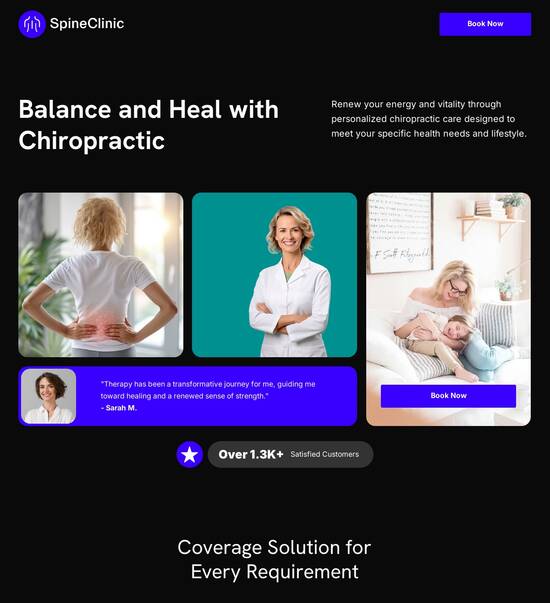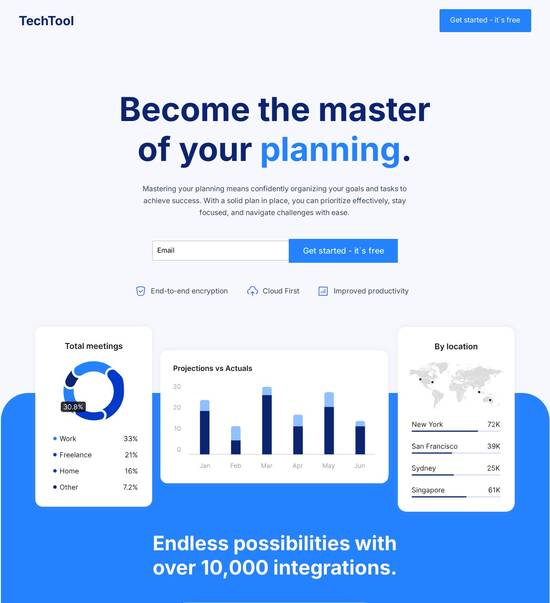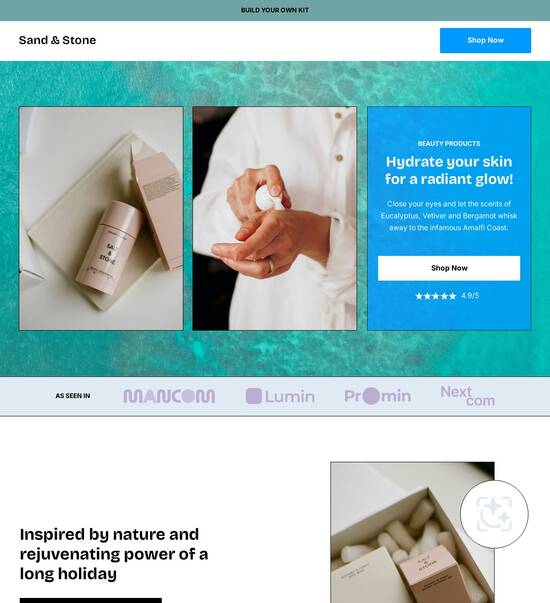
Landing page template with interactive event booking form
Explore Similar TemplatesAbout template
Use landing page templates with interactive event booking form and make your communications easy and transparent. Try our solution today.
Recommended templates

Easy to build without coding
With the intuitive drag-and-drop builder, anyone on your team can create high-converting pages without any knowledge of code or design. Make enhancements to your landing page with custom widgets using Javascript, HTML/CSS, or third-party scripts.

Multiple layouts for any industry and goal
Select from 500+ landing page layouts built to boost conversions across industry-specific scenarios. Customize them by adjusting fonts, adding images, and generating on-brand content with the AI assistant. Quickly scale with Instablocks® and Global Blocks that you can save, reuse, and update globally.

Loads fast and looks polished on any device
Every template is responsive, which means they present professionally on any device and load blazingly fast with our Thor Render Engine. You can also power them up with Google AMP technology to deliver an unparalleled mobile experience and drive higher conversions.

Robust analytics & experimentation
Get real-time updates and reporting across all your devices, showing the number of visitors, conversions, cost-per-visitor, and cost-per-lead. Launch AI-powered experiments, run A/B tests, and use heatmaps to analyze user behavior, then optimize your landing page to maximize conversions.







Easy to build without coding
With the intuitive drag-and-drop builder, anyone on your team can create high-converting pages without any knowledge of code or design. Make enhancements to your landing page with custom widgets using Javascript, HTML/CSS, or third-party scripts.
Multiple layouts for any industry and goal
Select from 500+ landing page layouts built to boost conversions across industry-specific scenarios. Customize them by adjusting fonts, adding images, and generating on-brand content with the AI assistant. Quickly scale with Instablocks® and Global Blocks that you can save, reuse, and update globally.
Loads fast and looks polished on any device
Every template is responsive, which means they present professionally on any device and load blazingly fast with our Thor Render Engine.
Robust analytics & experimentation
Get real-time updates and reporting across all your devices, showing the number of visitors, conversions, cost-per-visitor, and cost-per-lead. Launch AI-powered experiments, run A/B tests, and use heatmaps to analyze user behavior, then optimize your landing page to maximize conversions.
All the features you need to build event landing page design template
Explore more featuresLearn how to build event booking form template
Frequently asked questions about booking widgets in landing pages
Leading the way in building high-performing landing pages





Advertising booking form template: Your ultimate how-to guide
Using a landing page template with an interactive event booking form is crucial in today’s digital marketing spaces, particularly for businesses aimed at optimizing conversions. A well-structured landing page can effectively manage visitor data while driving conversions through engaging interactions. Instapage offers the tools needed to create such targeted templates seamlessly, regardless of your team size or budget.
Understanding the power of landing page templates
Landing page templates are designed to streamline the conversion process, providing marketers with a framework to build visually appealing and optimized pages efficiently. These templates are essential for businesses that want to consistently capture leads and drive events. With over 100 pre-built templates available on Instapage, marketers can adjust layouts to suit their unique objectives without needing coding expertise.
- Increased conversion rates: Templates are crafted with conversion psychology in mind, utilizing elements that enhance user experience.
- Time-saving designs: Launch pages in minutes with customizable templates that do not require prolonged development cycles.
- Cost efficiency: Access to ready-to-use templates allows businesses of all sizes to execute high-quality marketing strategies without the overhead of hiring extra developers.
Steps to create an interactive booking form
Creating an interactive booking form within your landing page template involves several straightforward steps to ensure functionality and user engagement.
- Select your base template: Choose a landing page template that aligns with your event goals and branding.
- Incorporate event booking features: Use Instapage’s elements library to add form fields, dropdowns, and date selectors that allow visitors to register for events seamlessly.
- Optimize for mobile: Ensure that your landing page and booking form are fully responsive and provide an excellent user experience across all devices.
Personalizing your booking experience
Personalization can significantly enhance the user experience on your landing page. By utilizing dynamic content strategies, you can tailor the booking form to resonate with different segments of your audience.
- Dynamic text replacement: Adjust headers or calls-to-action based on user demographics to increase relevance.
- Segment-specific forms: Customize questions or required fields based on which segment of your audience is visiting your page.
- Real-time updates: Integrate functionalities that adjust the form based on previous user interactions for a more tailored experience.
Incorporating these strategies can foster higher engagement and ultimately lead to improved conversion rates for your event.
By leveraging Instapage's capabilities to create an interactive event booking form within your landing page template, you set the stage for enhanced marketing success.
Take the steps today to transform your landing pages! Start building with Instapage's intuitive, high-converting templates and unlock your marketing potential.
People also ask about conference booking form template
The power of interactive event booking: transforming landing pages through innovative templates
Understanding the importance of a dedicated event landing page
Event landing pages serve as the central hub for information related to specific gatherings. These pages consolidate all necessary information, such as event dates, locations, agendas, and registration details, into a single accessible format. This centralization enhances the attendee experience right from the beginning, allowing potential guests to easily understand what the event offers without sifting through multiple platforms or sources.
Interactivity plays a crucial role as well, as it provides users with engaging and informative experiences. When prospective attendees can interact with elements on the page—such as dynamic choose-your-own-path options—it significantly increases the likelihood that they will follow through and register for the event. Interactive pages not only improve user engagement but also lead to higher conversion rates, which is essential for event marketers.
Features of interactive event booking forms
An interactive event booking form goes beyond basic information gathering; it's designed to streamline the registration process while enhancing the user experience. Key components often include a variety of form fields that ensure the collection of essential attendee details such as name, email address, and preferred ticket type. Each of these fields must be thoughtfully placed and easy to complete, to minimize friction during the booking procedure.
Payment integration should be seamless, allowing attendees to complete transactions without navigating away from the landing page. Additionally, real-time availability updates enable users to see the current status of ticket availability, ensuring they have the latest information as they make their reservations. Furthermore, a user-centric design prioritizes mobile responsiveness, ensuring that attendees can register from any device with ease, which is crucial in an increasingly mobile-driven world.
Form fields
Collect necessary attendee information (name, email, ticket type).
Payment integration
Seamless transactions directly through the page.
Real-time availability updates
Keeping attendees informed about booking statuses.
The anatomy of an effective event landing page template
An effective event landing page template consists of several essential sections that work together to inform and engage attendees. Initially, an 'Event Overview' section provides a brief but compelling description, including key details like date, time, and location, while highlighting what makes this event unique or valuable to attend.
Following this, a 'Speaker Line-Up' showcases the featured speakers and their credentials, offering potential attendees an insight into who will be presenting. This section can include interactive links to speakers' profiles, allowing users to explore their backgrounds further. An 'Agenda Breakdown' allows attendees to view the event schedule clearly. Interactive features enable users to filter sessions by topics of interest, enhancing personalization. Other sections, such as 'Testimonials and Past Events,' can share attendee feedback collected from previous events via sliders or carousels, building social proof and trust, as well as an 'FAQs' section that quickly addresses common inquiries through an interactive toggle feature.
Event Overview
Brief description including date, time, and location, highlighting the event’s unique value proposition.
Speaker Line-Up
Showcasing featured speakers and their credentials.
Agenda Breakdown
Clear outline of the event schedule with interactive elements to allow users to filter sessions.
Testimonials and Past Events
Sharing attendee feedback to build trust.
FAQs Section
Addressing common attendee questions upfront.
The creation process of an event landing page
Creating an effective event landing page can be made simple through the use of user-friendly builders. A drag-and-drop interface streamlines design, ensuring that even those without technical skills can craft an attractive page. Pre-designed templates are often available, allowing event marketers to kickstart the creation process while ensuring an organized layout that adheres to best practices.
Customization options are essential for tailoring templates to align with your brand identity. This includes the ability to change color schemes and fonts, as well as adding logos and branded images. Such adjustments help to foster recognition amongst visitors while maintaining the overall aesthetic continuity of your marketing materials and website.
Enhancing attendee engagement through unique takeaways
Offering unique takeaways can significantly enhance the overall attendee experience on event landing pages. Personalized recommendations based on the interests and demographics of the visitor encourage deeper engagement and may drive conversions. For instance, using data from previous interactions allows for tailored suggestions that resonate with potential attendees.
Beyond personalization, incorporating gamification elements such as loyalty points for early registrations can create excitement around the event. Interactive polls can further enhance engagement by gathering input on event logistics and content preferences. Both strategies ensure that attendees feel active and invested even before the event begins, thereby increasing the likelihood of attendance.
Leveraging data for future events
Data collected from the landing page not only serves immediate needs but also proves invaluable for future events. Tracking user interactions reveals insights about form completion rates and drop-off points, helping marketers understand where users may face challenges during registration. This analysis can aid in refining the process for future iterations, ensuring a smoother experience for attendees.
Additionally, establishing feedback loops is crucial for continuous improvement. Integrating post-event surveys into the landing page allows for gathering valuable feedback directly from attendees. This data can be instrumental in planning subsequent events, as it helps to understand which aspects are most appreciated and which areas require refinement.
Strategies for driving traffic to your event landing page
Utilizing multi-channel marketing approaches is crucial when aiming to drive traffic to your event landing page. Social media teasers can create anticipation, guiding potential attendees to the landing page for more information and registration. Meanwhile, targeted email campaigns can segment audiences effectively, ensuring that specific groups receive personalized invites that highlight the event's relevance to their interests.
SEO best practices should also be implemented to optimize the landing page content for search engines. Identifying and incorporating keywords relevant to event themes and audience interests will enhance visibility, helping potential attendees discover the event organically. Together, these strategies create a multifaceted approach to increasing traffic and, ultimately, attendee registrations.
Evaluating the success of your landing page
To gauge the effectiveness of your landing page, monitoring key metrics is essential. Conversion rates provide insights into the percentage of visitors who end up registering for the event. Similarly, engagement rates, which look at the time spent on the page and interactions with various elements, inform whether visitors find the content compelling and relevant.
Another important metric is the bounce rate, which indicates how quickly users leave the page. A high bounce rate may suggest that the landing page is failing to engage visitors or meet their expectations. Continuous improvement should be driven by data analysis; A/B testing different components like CTAs and layouts can yield insights on what resonates best with your audience.
Conversion rates
Percentage of visitors who become attendees.
Engagement rates
Time spent on the page, interactions with components.
Bounce rates
Understanding how quickly users leave the page.
Real-life case studies: success stories with interactive event landing pages
Analyzing real-life case studies showcases the effectiveness of interactive event landing pages in increasing attendance. Organizations that have implemented these strategies often observe significant improvements in their registration numbers. For instance, specific metrics can illustrate a before-and-after scenario, highlighting increases in attendee sign-ups and engagement levels.
Additionally, there are valuable lessons learned from these experiences. Key takeaways often revolve around understanding your audience's needs and preferences, ensuring that each design element serves a purpose. Recognizing and avoiding common pitfalls, such as overcomplicating the registration process, will ultimately lead to a more successful event landing page.
Future trends in event landing page development
Looking ahead, we can anticipate emerging technologies influencing the development of interactive event landing pages. Features like augmented reality (AR) and virtual reality (VR) are poised to enhance event promotion, providing immersive experiences that could attract more attendees. Additionally, a noteworthy trend will be the move towards hyper-personalization, enabling marketers to tailor messaging and content to the unique preferences of each attendee.
The evolution of booking forms will not lag behind, as advancements in artificial intelligence and machine learning present opportunities for refined interactions and processes. As these technologies integrate with existing platforms, the overall booking experience will likely become more streamlined, efficient, and user-friendly. Event organizers should stay attuned to these trends to continually enhance their strategies.
Ready to skyrocket conversions?
Supercharge your ad campaigns with high-performing landing pages
Get started














